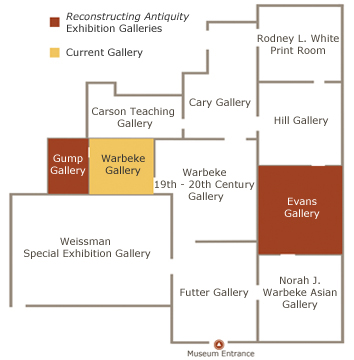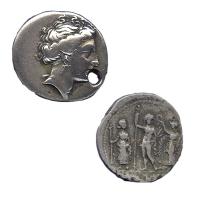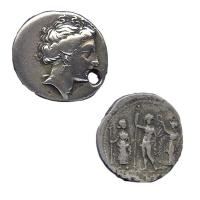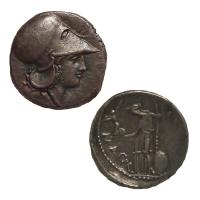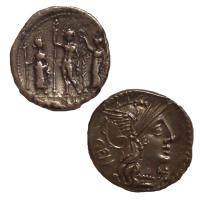Gods and Goddesses
Learn more about the object below
Although modern governments generally operate under a separation of church and state, the ancient world was quite the opposite. Nearly everyone in ancient societies participated in the ceremonies and rituals associated with state religions. Governments set aside public holidays for religious observances and, in Rome, for example, appointed religious officials just like they appointed civic officials. Unsurprisingly, ancient coins depict the divinities that were so integral to everyone's lives.
The Greek city-states minted coins featuring their patron deities and other gods revered by their people, like #56, a coin from Syracuse depicting Athena. A temple dedicated to Athena in Syracuse and her presence on this coin both indicate her importance to the ancient city. Likewise families in the Roman Republic put their associated deities on currency, such as #65. Minted by Julius Caesar, this coin depicts the goddess Venus. Caesar, like the rest of the Julian family to which he belonged, considered themselves direct descendants of Venus through the epic hero Aeneas. As such, they were quick to remind the world of their grand heritage at every possible opportunity, including on their coinage.
Mythology took precedence in early Roman coinage, much like on #59. Look at the coin's three standing figures: Jupiter, Juno, and their daughter Minerva. Though tiny and cramped on the face of the small silver coin, these three figures of the 'Capitoline Triad' have a regal presence. On the opposite side, the head of the goddess Roma appears wearing a helmet over her flowing hair, very much like how she appears on neighboring coin #57. As the personification of the city of Rome, and as the city's patron goddess, Roma appeared on Republican coinage for many years. Only the most important gods and goddesses appeared on the earliest Roman coinage.
Label text by Kathryn Breen Russell, Research Assistant, Mount Holyoke College Art Museum
Suggested Readings:
Esdaile, Katherine A. “An Essay Toward the Classification of Homeric Coin Types.” The Journal of Hellenic Studies, 32 (1912). 298-325.
Mattingly, Harold. “The First Age of Roman Coinage.” The Journal of Roman Studies, 19 (1929). 19-37.
Voelkel, Laura B. “Coin Types and Roman Politics.” The Classical Journal, 43.7 (1948). 401-405.
